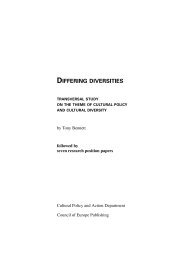Why we need European cultural policies: the impact of EU ...
Why we need European cultural policies: the impact of EU ...
Why we need European cultural policies: the impact of EU ...
You also want an ePaper? Increase the reach of your titles
YUMPU automatically turns print PDFs into web optimized ePapers that Google loves.
<strong>the</strong>re <strong>we</strong>re very high expectations from <strong>the</strong> candidate countries regarding possible financialbenefits <strong>of</strong> participation in Community programmes. At first, <strong>the</strong> biggest obstacle to obtainingfunds was a lack <strong>of</strong> knowledge and experience about application procedures. Eventually,<strong>cultural</strong> operators began competing equally with o<strong>the</strong>rs from all member states and <strong>the</strong> mostrecent reports – from <strong>the</strong> <strong>European</strong> Forum for <strong>the</strong> Arts and Heritage (EFAH) or <strong>the</strong> BudapestObservatory, for example – have not revealed significant gaps.All Compendium country reports, analyzed for this study have referred to <strong>the</strong> <strong>EU</strong> fundingprogrammes. Some authors <strong>of</strong> those reports claimed, and this has been confirmed in variousstudies, that cooperation within <strong>the</strong> <strong>EU</strong>, including new members and candidate countries, wasincreasing. Ho<strong>we</strong>ver, it is important to mention that <strong>the</strong>re have also been reports about a lack<strong>of</strong> resources or interest for neighbouring countries to <strong>the</strong> east, which are outside <strong>the</strong> new <strong>EU</strong>borders. The consequences <strong>of</strong> developments such as this have been widely debated by policymakersand <strong>cultural</strong> operators.With limited budgets and a focus on multilateral cooperation, <strong>the</strong> goals <strong>of</strong> <strong>the</strong> Communityfunding programmes have been quite different from those <strong>of</strong> <strong>the</strong> individual <strong>EU</strong> member states.The programmes <strong>we</strong>re meant to complement ra<strong>the</strong>r than to replace funding provided by nationalgovernments. They could be seen as exemplifying <strong>the</strong> <strong>EU</strong> principles <strong>of</strong> complementarity andsubsidiarity, as <strong>the</strong>se are translated into concrete policy actions.The evidence from <strong>the</strong> programmes has also drawn attention to <strong>the</strong> fact that <strong>cultural</strong> policy <strong>of</strong> <strong>the</strong><strong>European</strong> Union has consisted <strong>of</strong> two inseparable parts. Nation states have more or less clearstrategies for culture, enabling <strong>the</strong>ir financing to follow fairly clear guidelines. At <strong>EU</strong> level, ho<strong>we</strong>ver,<strong>the</strong> lack <strong>of</strong> an elaborated <strong>cultural</strong> policy has certainly impaired <strong>the</strong> effectiveness <strong>of</strong> monitoring<strong>the</strong> results <strong>of</strong> Community programmes in that sphere. As one authoritative report on <strong>cultural</strong>cooperation argues, <strong>EU</strong> Programmes should aim to support projects with a clearly elaborated<strong>European</strong> dimension and added value, even though it is not really clear what that would mean.87When looked at in <strong>the</strong> context <strong>of</strong> <strong>the</strong> <strong>EU</strong> enlargement, it is possible to claim that <strong>the</strong>seprogrammes did not seem to deal with any specific challenges facing <strong>cultural</strong> policy priorities<strong>of</strong> <strong>the</strong> future member states. In fact, <strong>the</strong> assumptions behind <strong>the</strong> programmes’ design was that<strong>the</strong> new member states would comply with existing priorities. This had a positive side-effect as<strong>cultural</strong> operators in new member states had to adopt <strong>the</strong>ir ways <strong>of</strong> working in order to be eligiblefor <strong>the</strong> money. At that time, at least for <strong>the</strong> <strong>cultural</strong> sector, <strong>the</strong>re was no o<strong>the</strong>r support for <strong>the</strong>major structural reforms that <strong>the</strong> sector was undergoing as a consequence <strong>of</strong> <strong>the</strong> transition fromsocialism. The exception was <strong>the</strong> audio-visual sector: <strong>the</strong> Programme MEDIA did make resourcesavailable for some structural changes as <strong>we</strong>ll as for education <strong>of</strong> creators and producers in orderto prepare <strong>the</strong>m for <strong>the</strong> participation in <strong>the</strong> single audio-visual market.The questionnaire did not ask specific questions about intellectual property rights (IPR). Soonafter <strong>the</strong> beginning <strong>of</strong> <strong>the</strong> transition, post-socialist countries started bringing <strong>the</strong>ir copyright andO<strong>the</strong>r issues59














